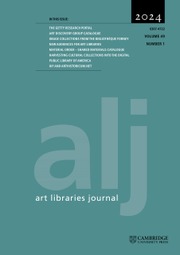No CrossRef data available.
Article contents
Postcards from the edge: a journey of transition from art librarian to educational developer
Published online by Cambridge University Press: 05 April 2017
Extract
In reflecting upon my own transition from art librarian to academic developer, I can strongly relate to my library colleague's frustration in terms of espousing ‘what works’, with ‘earning the right to be heard’. We know we need to move beyond deficit models of learning support which are not practically, pedagogically or ethically supportable. But, we are compromised in this quest by traditional perceptions of the librarian and academic developer role, which do not always position us as equal with our academic partners or as a key partner in the student learning process.
Information
- Type
- viewpoint
- Information
- Art Libraries Journal , Volume 42 , Special Issue 2: Information Literacy in UK and US Art Libraries , April 2017 , pp. 63 - 65
- Copyright
- Copyright © ARLIS/UK&Ireland 2017
References
1. Land, R., “Academic development: Identity and paradox”, in Changing Identities in Higher Education: Voicing Perspectives, ed. Barnett, R. & Di Napoli, R. (Abingdon, UK: Routledge, 2008)Google Scholar
2. Freire, P., Pedagogy of the Oppressed (London: Penguin, 2001)Google Scholar
3. Aronson, E., The Jigsaw Classroom (Oxford: Sage, 1978)Google Scholar
4. Peacock, J., “Teaching skills for teaching librarians: postcards from the edge of the educational paradigm”, Australian Academic & Research Libraries 32(1) (2001): 26–42 Google Scholar
5. Appleby, Y. & Pilkington, R., Developing Critical Professional Practice in Education (Leicester: NIACE, 2016)Google Scholar
6. Whitchurch, C., “Shifting identities and blurring boundaries: the emergence of third space professionals in UK higher education”, Higher Education Quarterly 62 (2008): 377–396 Google Scholar
7. Kensington-Miller, B., Renc-Roe, J. and Moron-Garcia, S., “The chameleon on the tartan rug”, International Journal for Academic Development 20(3) (2015): 279–292 Google Scholar
8. Mitchell, L. & Mitchell, E., “Using SoTL as a lens to reflect and explore for innovation in education and librarianship”, Technical Services Quarterly 32 (2015): 46–58 Google Scholar
9. Granovetter, M., “The strength of weak ties: a network theory revisited”, Sociological Theory 1 (1973): 201–233 CrossRefGoogle Scholar
10. Lee, A. & McWilliam, E., “What game are we in? Living with academic development”, International Journal for Academic Development 13(1) (2008): 67–77 Google Scholar
11. D. Thompson, “In conversation with”, ARLIS matters. Available https://arlismatters.wordpress.com/2016/08/01/in-conversation-with-4/
12. Levy, P. & Roberts, S., Developing the New Learning Environment: The Changing Role of the Academic Librarian (London: CILIP Publishing, 2005)Google Scholar.
13. Whitchurch, C., Reconstructing Identities in Higher Education: The Rise of “Third Space” Professionals (London: Taylor & Francis, 2012)CrossRefGoogle Scholar.
14. Gibbons, M., Camille, L., Helga, N., Simon, S., Peter, S. & Martin, T., The New Production of Knowledge: The Dynamics of Science and Research in Contemporary Societies (London: Sage, 1994)Google Scholar.
15. Whitchurch, C., “Shifting identities and blurring boundaries: the emergence of third space professionals in UK higher education”, Higher Education Quarterly 62 (2008): 377–396 Google Scholar
16. Levy, P. & Roberts, S., Developing the New Learning Environment: The Changing Role of the Academic Librarian (London: CILIP Publishing, 2005)Google Scholar.
17. Roxa, T., Martensson, K. & Alveteg, M., “Understanding and influencing teaching and learning cultures at university: a network approach”, International Journal of Higher Education and Educational Planning 62(1) (2011): 99–111 Google Scholar
18. Sutherland, K., “Academic developers as partners in change, scholarship, and reflection”, International Journal for Academic Development 19(3) (2014): 159–161 CrossRefGoogle Scholar

